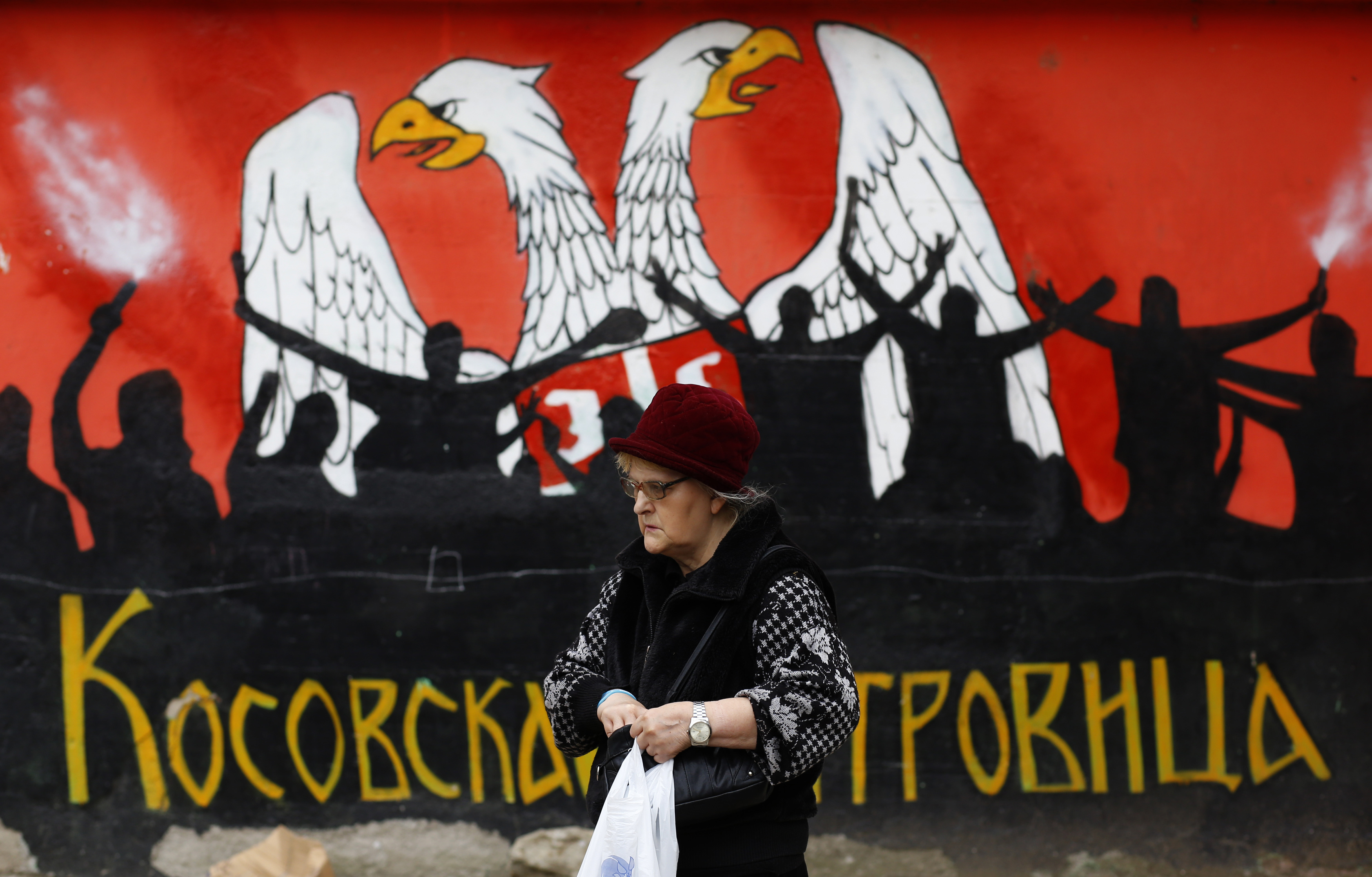The disaster of Kosovo should be a warning to all humanitarian interventionists
Kosovo's crumbling state is proof that there is no such thing as an easy intervention


It’s been almost 16 years since a NATO coalition banded together to defeat Serbia’s Slobodan Milošević in Kosovo. Ever since, it has been exhibit A in the case for “humanitarian intervention.” A swift short war, a thug removed from power, a series of oppressions redressed. After the hostilities ceased, Kosovo’s government was overseen by the United Nations, and declared full independence from Serbia in 2008.
In the meantime, the U.N. bungled possibly the easiest show-trial in world history, letting Milošević score a lot of points from the stand as the trial dragged on longer than it took F.D.R. to declare war on Germany, mobilize a few million men, and beat Hitler. Milošević died of a heart attack in prison before his trial finished. NATO troops are in Kosovo, a decade and a half after the “short” 78-day campaign.
What’s the political scene like in liberated Kosovo? Well, here’s a story. Last week Aleksandar Jablanovic, an ethnic Serb who served in the cabinet as minister of communities, was sacked by Prime Minister Isa Mustafa, in order to appease ethnic Albanians who were planning riotous protests against him. Kosovars threw rocks at government buildings. About 170 people were injured in the clash between protesters and police.
The Week
Escape your echo chamber. Get the facts behind the news, plus analysis from multiple perspectives.

Sign up for The Week's Free Newsletters
From our morning news briefing to a weekly Good News Newsletter, get the best of The Week delivered directly to your inbox.
From our morning news briefing to a weekly Good News Newsletter, get the best of The Week delivered directly to your inbox.
What did Jablanovic do to cause the unrest? He had described a group of Albanians as “savages” in January. Why? Because they had blocked (with the threat of violence) the route of Serbian Christians making a traditional pilgrimage to a monastery in Western Kosovo.
Sounds unpleasant, right? It gets worse. Unemployment in Kosovo is around 45 percent. (That’s not a typo.) The electricity is very unreliable, and Kosovars often don’t pay their electricity bills to the state. The government is considering canceling all debts that citizens owe to the government, to rebuild trust (and popularity) and start putting services on a firmer footing. About a third of Kosovars live on less than $2 a day.
Kosovars aren’t putting up with it, and a wave of mass immigration to Western Europe has begun. Thousands of Kosovars are just picking up and leaving. A minister for education has said that some 5,200 pupils have vanished from Kosovo schools in the past five months, leaving with their families for Western Europe, usually via Serbia and Hungary. Many of them are seeking out refuge among the 700,000 to 800,000 Kosovar immigrants who live in enclaves in Switzerland and Germany, almost all of whom emigrated in the past 25 years.
The entire population of Kosovo is currently around 1.8 million. At this point it is unlikely that a single Kosovar in Kosovo is without a cousin in Western Europe. The E.U. isn’t happy about this, and is trying to work with Kosovo and Hungary to stop the tide.
A free daily email with the biggest news stories of the day – and the best features from TheWeek.com
It’s unlikely that the sacrifice of Jablanovic is going to appease the anger in the streets. If your electricity didn’t work years after a costly war with Canada, would you be happy just to see Ted Cruz humiliated? Ten seats in the Kosovo Assembly are reserved for ethnic Serbians, and so members of Jablanovic’s Serb List party have eight out of 120 total seats and occasionally take cabinet posts. This is no laughing matter, as neighboring Serbia has never recognized Kosovo’s existence as an independent country, and appears to exercise its own interests through elected Kosovo Serbs. Serbian Prime Minister Aleksandar Vučić recently visited Serbian enclaves in the northern parts of Kosovo. He was the first Serbian leader to do anything like this in years.
In no way can anyone say that Kosovo is worse off now than it would have been if Slobodan Milošević and Serbia had had their way. Milošević’s political, cultural, and then military campaign against Kosovars did nothing but expand until it was arrested from the outside.
But there’s also no doubt that Kosovo should serve as a permanent warning against the idea that humanitarian interventions are easy. The bombing was a perfect example of the moral hazard involved in “Responsibility to Protect” interventions. The roar of NATO jets so raised the stakes for Serbian forces and for Milošević, that Serbians killed five times as many people after the intervention became a fait accompli than they had before that time, under the theory that rubble makes less trouble.
And winning the peace has been impossible. Kosovo took a decade to escape the tutelage of the U.N. But the corruption, poverty, misgovernance, and ethnic violence in Kosovo are doing exactly what Milošević did: pressuring ethnic Albanians to leave.
Michael Brendan Dougherty is senior correspondent at TheWeek.com. He is the founder and editor of The Slurve, a newsletter about baseball. His work has appeared in The New York Times Magazine, ESPN Magazine, Slate and The American Conservative.
-
 Why it’s important to shop around for a mortgage and what to look for
Why it’s important to shop around for a mortgage and what to look forThe Explainer You can save big by comparing different mortgage offers
-
 4 ways to save on rising health care costs
4 ways to save on rising health care costsThe Explainer Health care expenses are part of an overall increase in the cost of living for Americans
-
 How to financially prepare for divorce
How to financially prepare for divorceThe Explainer Facing ‘irreconcilable differences’ does not have to be financially devastating
-
 'Once the best in the Middle East,' Beirut hospital pleads for fuel as it faces shutdown
'Once the best in the Middle East,' Beirut hospital pleads for fuel as it faces shutdownSpeed Read
-
 Israeli airstrikes kill senior Hamas figures
Israeli airstrikes kill senior Hamas figuresSpeed Read
-
 An anti-vax conspiracy theory is apparently making anti-maskers consider masking up, social distancing
An anti-vax conspiracy theory is apparently making anti-maskers consider masking up, social distancingSpeed Read
-
 Fighting between Israel and Hamas intensifies, with dozens dead
Fighting between Israel and Hamas intensifies, with dozens deadSpeed Read
-
 United States shares 'serious concerns' with Israel over planned evictions
United States shares 'serious concerns' with Israel over planned evictionsSpeed Read
-
 Police raid in Rio de Janeiro favela leaves at least 25 dead
Police raid in Rio de Janeiro favela leaves at least 25 deadSpeed Read
-
 Derek Chauvin's attorney files motion for new trial
Derek Chauvin's attorney files motion for new trialSpeed Read
-
 At least 20 dead after Mexico City commuter train splits in overpass collapse
At least 20 dead after Mexico City commuter train splits in overpass collapseSpeed Read
